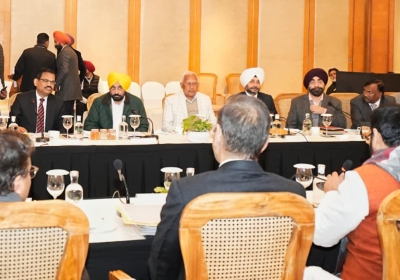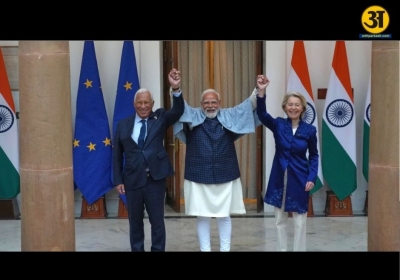
Live-in concept against middle class norms, says Allahabad High Court
Concept of live-in relationship goes against settled norms in middle class society, says Allahabad High Court
- By Gurmehar --
- Friday, 27 Jun, 2025
The Allahabad High Court has made strong remarks about live-in relationships, especially in the context of Indian middle-class society. While hearing a bail application, the court said that such relationships are against the "settled law" and traditional values followed by the Indian middle class. The observation was made by Justice Siddharth on June 24, 2025, while granting bail to a man accused of sexually exploiting a minor girl by promising marriage and later refusing to marry her.
This case has brought fresh focus on the social and legal challenges surrounding live-in relationships in India, despite them being legally recognised by the Supreme Court.
Court questions social impact of Live-In setup
The High Court expressed its concern over the rising number of live-in relationship cases landing in court. It said that although the Supreme Court has given legal recognition to live-in relationships, they still do not align with the social values of Indian middle-class families. According to the judge, this mismatch between legality and tradition has led to emotional distress, especially for women.
Justice Siddharth remarked, “After live-in relationships have been legalised by the apex court, the court is fed up with such cases. These cases are coming to court because the concept of live-in relationship is against the settled law in the Indian middle-class society.”
The judge pointed out that when live-in relationships end, men are often able to move on easily — they even get married again. But for women, especially those who are socially and emotionally invested in the relationship, it becomes difficult to find another life partner. The court said this social reality disproportionately harms women and often leaves them with fewer options and deep emotional pain.
The court's concern was not just about values but also about practical consequences. It said these relationships are resulting in a large number of legal disputes, especially when they end badly. Many of these cases involve promises of marriage, physical relationships without commitment, and even accusations of cheating or exploitation.
The High Court stressed that the young generation may be attracted to the concept of live-in relationships, but they do not always understand the consequences. The court said that relationships based only on physical closeness and no legal or social commitment often lead to heartbreak, legal battles, and long-term suffering.
In the present case, the accused was involved in a physical relationship with a minor girl. He had allegedly promised to marry her, but later refused. The girl’s family lodged a complaint, accusing the man of false promises and sexual exploitation under the POCSO Act and relevant sections of the Bharatiya Nyaya Sanhita (BNS). The court noted the seriousness of the charges but also considered the specific facts presented during the bail hearing.
Bail granted in exploitation case
The accused in this case, named Shane Alam, had been in jail since February 22, 2025. His lawyer argued in court that he had no criminal background and that the girl had willingly travelled with him to various places. The lawyer said that while the relationship may not have ended well, there was no evidence of criminal intent or force.
On the other side, the lawyer for the girl argued that the accused had ruined her life. He said that the accused’s actions would make it very difficult for the girl to get married in the future and that her mental and emotional well-being had been destroyed.
The court, after listening to both sides, decided to grant bail to the accused. It said that since the investigation was mostly complete and the accused had no past criminal record, he should not be kept in jail during the trial. However, the court also noted that the girl's pain was real and that such cases are becoming too common in today’s society.
The judge made it clear that while live-in relationships may be legal, they are creating serious social issues. The court’s remarks seem to suggest that legal recognition alone is not enough — societal values, expectations, and the emotional well-being of the people involved also need to be considered.
ALSO READ: 2 killed, 50 injured as double-decker bus overturns on Lucknow-Agra Expressway
ALSO READ: India joins BRICS members to express grave concern at military strikes on Iran
This case has started a debate about the growing gap between modern legal rights and traditional Indian social structures. Many people agree that young adults today are choosing their relationships freely, but the fallout from failed relationships, especially live-ins, still causes lasting harm, particularly to women.
The court did not pass any judgment on the concept of live-in relationships itself, but it did highlight the need for society to think deeply about how such relationships are viewed and what kind of protections are needed to prevent abuse.
Legal experts say that while courts must follow the law, they also cannot ignore social realities. The Supreme Court has previously ruled that live-in relationships between consenting adults are not illegal. In some cases, the top court has even recognised the rights of live-in partners to property, maintenance, and protection from domestic violence.
But as the Allahabad High Court has now pointed out, there is still a big divide between what is legal and what is socially accepted. In Indian middle-class society, especially in smaller towns and conservative families, live-in relationships are still viewed with suspicion. Women who enter such relationships often face social stigma if the relationship fails, making it harder for them to marry or be accepted again.
The current case shows how this social stigma can turn a relationship into a criminal case, especially when the relationship involves a promise of marriage or a minor. The court's decision to grant bail does not mean the accused is innocent — it simply means that he will face trial while not in jail.
As more young people enter into live-in relationships, it is likely that more such cases will reach the courts. Some legal experts are calling for stronger laws to protect both partners in a live-in setup, especially when it comes to issues like false promises, consent, and emotional damage.
In conclusion, the Allahabad High Court’s recent remarks add an important voice to the ongoing conversation around love, relationships, law, and society in modern India. While live-in relationships may offer personal freedom, they also carry serious emotional and social consequences — especially for women. The court’s warning should be taken seriously by young couples, lawmakers, and society as a whole.





